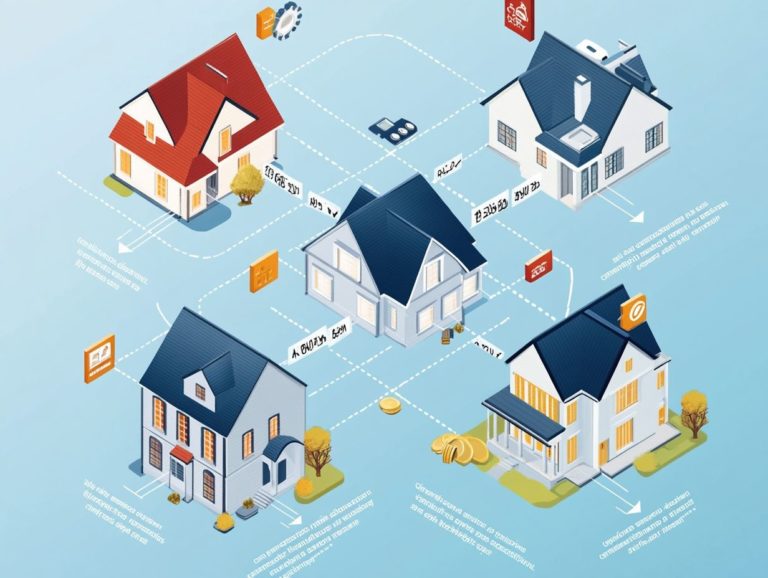5 Essential Questions to Ask Your Lender
Navigating the world of loans can feel overwhelming, given the many factors at play. To ensure you make informed decisions, it s essential to ask the right questions before committing to any lender.
This article presents five essential questions designed to clarify the terms of your loan while illuminating potential costs and risks. From interest rates to repayment options, arm yourself with the knowledge needed to navigate your loan application successfully.
Contents
Key Takeaways:
- Know the interest rate to understand the total cost.
- Understand closing costs to avoid unexpected expenses.
- Ask about prepayment penalties to avoid extra fees.
1. What Is the Interest Rate on the Loan?
Understanding the interest rate on a loan is crucial for you as a homebuyer. It significantly impacts the overall cost of your mortgage.
Several factors determine the interest rate. These include lender policies, your financial profile, and market conditions.
For example, a higher credit score boosts your chances of approval and can also lead to lower interest rates. A lower score might result in higher costs over time. The size of your down payment is also critical; a larger down payment can reduce the lender’s risk, potentially leading to a more favorable rate.
Market trends can complicate things. Economic shifts can raise or lower average interest rates.
Imagine you choose a fixed-rate mortgage at 4% compared to an adjustable-rate mortgage starting at 3%. While the latter may seem like a steal initially, rate fluctuations could lead to significantly higher payments in the long run. This scenario underscores the importance of making informed decisions.
2. What Are the Closing Costs?
Closing costs are important costs to consider when finalizing a home purchase or loan. Typically ranging from 2% to 5% of the loan amount, these costs can cover various expenses like appraisal fees, mortgage insurance, and administrative costs charged by lenders and service providers.
These fees play a crucial role, ensuring that both you and the lender are protected throughout the transaction. For example, appraisal fees help confirm the house’s value, while title insurance guards against potential legal claims on your new home.
You might find these costs surprising, but understanding them can alleviate financial stress. By engaging in strategic negotiations with lenders or exploring down payment assistance programs offered by various organizations, you can significantly reduce those closing costs, making your transition into homeownership a much smoother experience.
3. Are There Any Prepayment Penalties?
Prepayment penalties are fees some lenders impose if you decide to pay off your loan early. These can significantly impact the overall cost of your mortgage and affect your choices around refinancing or repaying your loan ahead of schedule.
These penalties can manifest in various ways, such as a percentage of your remaining balance or a fixed number of months’ interest. They may apply under specific conditions, like when you refinance within a certain timeframe or sell the property before a designated period has elapsed.
For many, understanding these fees is essential, as they can obstruct financial goals, such as achieving debt freedom sooner or seizing opportunities in a favorable interest rate market. Thus, when you evaluate potential loans, it s crucial to compare lenders carefully to find the best deal.
This approach enhances your financial strategy and supports your long-term financial health.
4. What Are the Loan Terms and Repayment Options?

Loan terms and repayment options are crucial components of the mortgage process. They can significantly shape your financial strategy. These elements determine your repayment period, interest rate, and payment schedule flexibility. They should align with your financial goals.
Understanding the distinctions between a 15-year and a 30-year mortgage is essential. Each term brings its own implications regarding monthly payments and the total interest you ll pay over time. A 15-year mortgage usually offers lower interest rates and helps you build ownership in your home faster. However, higher monthly payments might strain your budget.
A 30-year mortgage provides more manageable payments, although you could face higher interest costs over the long haul. When considering fixed-rate versus adjustable-rate options, you must balance stability with potential savings.
Fixed-rate mortgages offer predictability. In contrast, adjustable-rate products may start with lower initial rates but come with risks if market conditions shift. Getting approved for a loan gives you power in negotiations with lenders. Approval signals your creditworthiness and financial stability, making it easier to secure favorable terms.
5. Is There Any Flexibility in the Payment Schedule?
Flexibility in your mortgage payment schedule can be a game changer! Customize your payment plan to fit your financial situation. Whether it s opting for bi-weekly payments or having the freedom to make extra payments without facing penalties, this adaptability can make a significant difference.
This approach also makes managing your budget simpler and can contribute to long-term savings on interest.
As you explore your options, consider various schedules like monthly, bi-weekly, or even accelerated bi-weekly payments. Each choice has its perks. For instance, bi-weekly payments can help you reduce the overall interest you ll pay over the life of the loan.
Keep in touch with your lender! Open communication can uncover tailored strategies to help you manage your payments effectively. Engaging in dialogue can lead to smoother cash flow management.
What Documents Do I Need to Provide for the Loan?
When you apply for a mortgage, it s crucial to prepare a range of documents. These documents provide lenders with insight into your financial situation. This not only streamlines the loan processing phase but also boosts your chances of securing favorable terms and approval.
To ensure a seamless application experience, gather essential documents like proof of income think recent pay stubs or bank statements and tax returns from the past two years. You ll also want to have your credit history ready, as lenders will scrutinize this information to evaluate your creditworthiness.
Staying organized is key. Carefully labeling and categorizing your documents simplifies submission and accelerates the review process.
Accuracy in these details is vital, as any discrepancies could lead to delays or even denials in financing.
What Is the Loan Application Process Like?
The loan application process can feel like an intricate journey for homebuyers. It features several steps such as prequalification, document gathering, and ultimately submitting your application to a lender leading to loan approval, which provides the funds needed for your home purchase.
Navigating each stage demands your careful attention and proactive mindset. It all starts with prequalification, which sets the stage and gives you a crystal-clear understanding of how much you can afford.
Once you have that foundation, it s time to gather essential documents like income verification, tax returns, and credit histories. By organizing these in advance, you can streamline your application process.
After you submit your application, you may find yourself in a waiting game as lenders evaluate your information. Keeping communication open with your lender and being ready to provide any additional details can significantly speed up this phase, paving the way for a smoother approval process.
What Are the Eligibility Requirements for the Loan?

Eligibility requirements for obtaining a mortgage vary widely among lenders. They typically include your credit score, the ratio of your debt to your income, and the down payment amount.
These factors determine if you qualify for a loan and what options are available. For FHA, VA, or USDA loans, you must understand the specific criteria involved.
FHA loans generally require a minimum credit score of 580 for a low down payment. VA loans offer unique benefits for veterans, including no down payment and no mortgage insurance.
USDA loans focus on rural properties, with income eligibility based on your location. To boost your chances of securing these loans, focus on a few key areas:
- Building your credit
- Reducing existing debt
- Maintaining stable employment
Accurate documentation of your income, assets, and debts strengthens your application. This makes the overall process smoother and increases your odds of qualification.
What Are the Potential Risks of the Loan?
Understanding the potential risks associated with a mortgage loan is essential for you as a homebuyer. These risks can significantly impact your long-term financial stability and overall homeownership experience.
Factors like variable interest rates, market fluctuations, and unforeseen changes in your personal circumstances all come into play. You should take a close look at your financial health, considering elements such as income variability, job security, and existing debts.
Adjustable-rate mortgages, in particular, can introduce a level of unpredictability, causing monthly payments to change. This can lead to financial strain if interest rates rise sharply.
Additionally, market volatility can influence property values, complicating your investment decisions. To effectively navigate these challenges, it s wise for you to plan for contingencies.
Ensure you have savings set aside to cover unexpected expenses. Ultimately, informed and proactive financial planning will be your key to successfully mitigating these risks and achieving a stable homeownership journey.
What Happens If I Am Unable to Make Payments on the Loan?
If you find yourself unable to make payments on your mortgage loan, the consequences can be dire and immediate. These include late fees, a hit to your credit score, and even the looming threat of foreclosure, which is the legal process where the lender takes back the property if payments are not made.
It s crucial for you as a homeowner to fully grasp your obligations and seek assistance whenever you encounter financial difficulties. Open communication with your lender is vital.
Many lenders are willing to work with borrowers facing hardships, so don t hesitate to reach out. Exploring refinancing options can also be a smart move, leading to more manageable payment terms or lower interest rates.
Additionally, seeking professional financial advice can provide valuable insights into budgeting and savings strategies. Taking proactive measures is essential; avoiding inaction can help you steer clear of penalties and protect your financial stability for the long haul.
How Can I Improve My Chances of Getting Approved for the Loan?
Improving your chances of getting approved for a mortgage loan involves several actionable strategies you can implement. Start by boosting your credit score, lowering your debt-to-income (DTI) ratio, and gathering the necessary documentation ahead of time to present a strong application to lenders.
Set clear financial goals to serve as your compass in this journey. Focus on systematically reducing existing debts; not only will this enhance your DTI, but it will also demonstrate responsible financial behavior to lenders.
It s essential to begin saving for a down payment early. This not only reduces the overall loan amount but can also give you leverage in negotiating better terms. Maintaining a solid credit profile by paying your bills on time is pivotal; this helps establish your reliability in the eyes of lenders.
Exploring prequalification and preapproval options can be beneficial. These steps provide valuable insights into your budget and strengthen your position during negotiations.
Frequently Asked Questions

What are the 5 essential questions to ask your lender?
Ask your lender these five essential tips for home financing: 1) What is the interest rate? 2) What are the loan fees and closing costs? 3) What is the loan term? 4) What are the payment options? 5) Are there any prepayment penalties?
Why is it important to ask about the interest rate?
The interest rate affects how much you will pay beyond the loan amount. Knowing it helps you understand the total cost of borrowing and compare lenders effectively.
What are loan fees and closing costs?
Loan fees and closing costs are extra expenses when getting a loan. They can include appraisal fees, credit check fees, and title insurance fees. Ask about these to grasp the total cost of the loan.
How does the loan term affect my payments?
The loan term is how long you have to repay the loan. A longer term might lower your monthly payments, but you’ll pay more in interest overall. Consider this before making your decision.
What are my payment options?
Explore available payment options like monthly, bi-weekly, or weekly payments. Some lenders offer flexible options, including the ability to make extra payments without penalties.
Are there any prepayment penalties?
Prepayment penalties are fees for paying off your loan early. Asking about these fees helps you avoid surprises and gives you the flexibility to pay off your loan sooner if you want.





